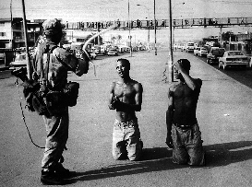
An international campaign to impose economic sanctions now threatens Nigeria’s $12 billion annual take from oil exports. Abacha, meanwhile, has countered with a public relations blitz to the tune of nearly $10 million. He’s recruited high-profile American allies to speak against proposed U.S. sanctions, including Nation of Islam leader Louis Farrakhan (“I will give Abacha a chance to do what he wants to do”) and Illinois Sen. Carol Moseley-Braun (“We have an obligation to see to it that [U.S.] policy…is formulated based on facts and not fiction or prejudice”), both of whom have visited Nigeria. Abacha has also bought the services ($3 million worth in 1995-96 alone) of well-connected U.S. lobbying and PR firms, including heavyweights Symms, Lehn & Associates (headed by former Idaho Sen. Steven Symms) and Ruder Finn (whose clients have included L.L. Bean and the Vatican).
In April 1997, Nigeria paid an estimated $598,600 for a 16-page advertising supplement in the Wall Street Journal, which featured a self-congratulatory interview with Abacha and lauded the “political, economic, and social stability” of his regime. Designed to appeal to foreign investors, the ad also praised Nigeria’s bank reform and fiscal austerity measures. (Abacha has allegedly siphoned off $1 billion from Nigeria’s oil revenues for his personal profit.)
The PR campaign even has a foothold on the Web. The Nigeria Today Web site is devoted to covering “Nigeria’s positive role in Africa & the World.” The site, maintained for the Nigeria Mission to the United Nations, features the transcript of a 1997 Abacha speech (“We all must imbibe the spirit of give and take, fair play, justice, and respect for the rule of law”), diatribes against U.S. meddling in Nigerian affairs—and upscale real estate listings.
All this is in sharp contrast to these rarely seen portraits of life inside Nigeria’s borders, captured by photojournalist Ray Onwuemegbulem and published for the first time in Mother Jones.









